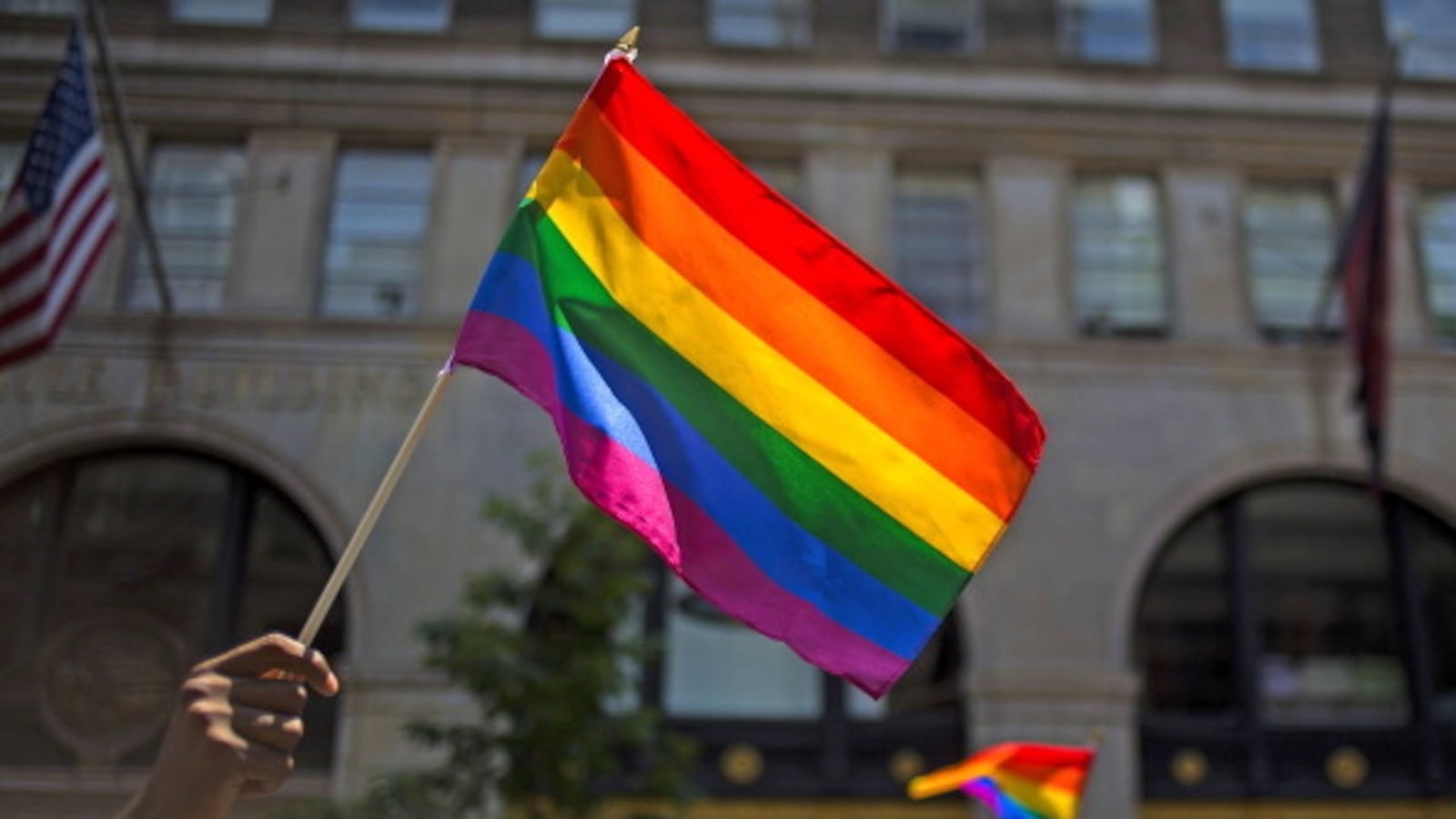Senator John Kennedy (R-LA) has a thing about genitalia. Around the time of Amy Coney Barrett’s Supreme Court confirmation process, he told Fox News, “If my Democratic friends want to turn it into an intergalactic freak show and bring back the protesters with the genitalia-shaped headgear, I can’t stop ’em. I just hope they won’t.”
On Wednesday, what lies between our legs was on his mind again, as he tried to clarify his disgust with the Equality Act—the proposed bill that would protect LGBTQ Americans from discrimination under federal law. If 70% of Americans, including 50% of Republicans, really do support the Equality Act as a new Human Rights Campaign (HRC) poll shows, Wednesday’s Senate Judiciary Committee hearing into the act showed why now would be a good time for those 70% of Americans to call their senators, pronto.
Sen. Kennedy spoke about trans kids as those opposed to equality have historically spoken about LGBTQ people—as would-be predators, reduced to alien body parts, summoning up changing rooms as the location where all future terrible trespasses would take place.
“Would this bill prohibit the boy with gender dysphoria from exposing his penis to the girls?” Kennedy asked Abigail Shrier, author of Irreversible Damage: The Transgender Craze Seducing Our Daughters.
Shrier, who spent the hearing responding in the affirmative to most anti-trans hypotheticals thrown her way, said: “I’m sorry, would it prohibit that?” she asked, looking at Kennedy as if he were beaming in from another planet.
“Yeah,” Kennedy grunted.
“No, I don’t…” Shrier struggled to say. Even for her, Kennedy seemed to be heading somewhere wacko.
“Would this bill prohibit the girls from exposing their genitalia to the boy that identifies as a girl?” Kennedy persisted.
“I don’t believe the bill addresses genitalia,” Shrier said, with a look that was as confused as everyone watching.
“Well, does it prohibit them from dressing together?” Kennedy continued.
“No,” came Shrier’s crisp response.
“Would this bill prohibit them showering together?” Kennedy wanted to know.
“No,” said Shrier. She looked puzzled, rightly so. Who knows what he was driving at, but Kennedy is hardly the first person to be focused on trans anatomy, rather than humanity and personhood.
Whatever else happens with the Equality Act, it is clearly too much to expect our lawmakers as they debate it to address LGBTQ people, and trans people in particular, with basic respect.
The hearing featured the familiar parties when it comes to LGBTQ issues. On one side, there were people detailing the discrimination LGBTQ people face, and its impact personally and politically. They were asking for nothing more than equal treatment, as enshrined by the Equality Act.
The breakout star of the hearing, 16-year-old trans teenager Stella Keating, who helped found the GenderCool project, noted that “less than half of the states in our country provide equal protection for me under the law. What happens if I want to attend college in a state that doesn’t protect me? Right now, I could be denied medical care or be evicted for simply being transgender in many states. How is that even right? How is that even American?
“What if I’m offered a dream job in a state where I can be discriminated against? Even if my employer is supportive, I still have to live somewhere. Eat in restaurants. Have a doctor. And why am I having to worry about all of this at the age of 16? This is the United States of America. The country that I love. Every young person ... every person ... regardless of who they are or who they love, should be able to be excited about their future.” (Naturally, Ben Shapiro has already come out to viciously attack Keating, her parents, and her very being.)
Keating spoke alongside a group of supportive Democratic senators, HRC President Alphonso David, and Edith Guffey, PFLAG National Board of Directors member and Conference Minister, Kansas-Oklahoma Conference with the United Church of Christ. David gave Lindsey Graham (R-SC)—apparently very concerned about the plight of male priests—a brief, emphatic lesson in civil rights law, while Guffey spoke powerfully about the canard of “religious freedom,” and how it had become weaponized as an instrument of prejudice. This was not the nature or purpose of faith and belief, as she and many others practiced it, she said.
On the other side—well, there are people who don’t believe in equality. 20 years ago, they would have been proud to voice that opposition, and general prejudice towards LGBTQ people, openly. Now, they know that does not play so well, so profess themselves worried about women’s spaces and women’s sports (because trans women are, in their narrow, misgendering minds, “biological men”) and “religious freedom,” meaning being able to refuse service to LGBTQ people because their faith should allow it.
Without the Equality Act, the peril facing LGBTQ rights, and trans people in particular, intensifies. Expect the 80+ anti-trans bills in state legislatures, focused on trans teens’ access to medical care and sports in schools, to increase. Expect there to be more cases bubbling up from the lower courts to the Supreme Court, such as the present SCOTUS case around the right of faith-based foster and adoptive care agencies to discriminate against LGBTQ parents, or protecting the right of conversion therapy practitioners to continue to say and do what they like.
Kennedy’s creepy questioning was the genie out of the bottle that revealed not that much had changed in 20 years. Shrier’s own book features a cover image of a little girl with a hole in her middle, implying that “the transgender craze seducing our daughters” is in her mind physically leaving them less-than.
Shrier, fellow witness Mary Rice Hasson, Kate O’Beirne Fellow in Catholic Studies at the Ethics and Public Policy Center, and their Republican cheerleaders did not have much to offer but fear, and the vista of unproven, future worst-case scenarios. There are no large numbers of young trans women beating young cis women in sporting competition; there are no large numbers of male prisoners saying they are trans so they can abuse cis female prisoners.
The image was even summoned up of men claiming to be women on the spot, in the moment, to take advantage of the Equality Act when it came to women’s spaces in sports and incarceration. In fact, NBC Out reported last year that it is trans women who face extreme levels of sexual assault in custody.
If Republicans and their supporters are so keen on these kinds of what-if-this-thing-happened, or this-one-case-proves-all argument, why do they not ban all men from owning guns when one man uses a gun to kill people? Why don’t they ban all female nurses when one female nurse is found negligent in the care of a patient? Pick one terrible person from any demographic; and ask why don’t Republicans seek to restrict the rights of the demographic they are part of.
If all you have are one-off examples—and if they are not fully told (as in the case of the Anchorage shelter cited by Sen. Marsha Blackburn (R-TN), reported by NewNowNext)—or one-off fear-framed situations of things that may happen, and if you believe that rational law for the majority can be extrapolated from such fanciful inventions, make this principle of Maybe Law universal. Of course this would be absurd, but when it comes to trans people it is seen as acceptable to inscribe baseless fear-mongering into legislation.
Shrier said more than once that she did not believe trans people set out to harm anybody, and then cited examples of alleged trans-sourced harm. Hasson stated incorrectly over and over again that the practice of religion itself was under attack from the Equality Act.
It is not; the act seeks to ensure that LGBTQ people cannot and should not be discriminated against, and it was telling that Hasson, and Republican senators hovered around stating their implicit desire, which seemed to be, “We and our churches want to be able to discriminate against LGBTQ people. The law should let us do that.” They talked delicately about religious rights being intruded upon, and left this true intention unspoken—and un-interrogated.
Is it heartening that people who want to discriminate against LGBTQ people feel they can’t say that out loud any more? Not really. Their disgust may have been reworded, but its presence and intent is just as blatant. Tellingly, the opponents of the Equality Act relentlessly misgendered trans people throughout Wednesday’s hearing, not willing to accord them that one sliver of respect.
There was also the implausible sight of shamed senators Ted Cruz (R-TX) and Josh Hawley (R-MI) suddenly transformed into feminist firebrands, anguished about the sanctity of women-only spaces. (The Equality Act doesn’t endanger women-only spaces.)
The Republicans who speak against the Equality Act have a redoubtable record of homophobia and voting against LGBTQ equality—they are not feminists, they are simply marking out the most acceptable rhetorical space in 2021 in which to argue for the maintenance of discrimination.
Republican speakers, and their witnesses, invariably said how much they believed in kindness and compassion, and that people should be treated the same, or with “respect.” And then came the “but.” Simply put, the “but” revolved around keeping the “religious freedom” to discriminate, and the right to exclude trans women from various women’s spaces and school sports teams.
Republicans see these as negotiable opt-outs, as opposed to being in fundamental opposition to the principle of equality. And this is where the battle over the Equality Act is. Currently, the act needs 10 Republican senators for it to pass—unless the filibuster is finally gotten rid of. The numbers, right now at least, don’t seem to be there, and so where does that leave the Equality Act, and the broader struggle for LGBTQ equality?
Ever since marriage equality became the law of the land, the Trump administration, Republican legislatures, and the many judges Trump appointed have been laser-focused on passing laws that chip away at the principle of the equality it enshrined—with “religious freedom” at the forefront. Republicans want the right to discriminate. And because the Republican bully today loves to play the ideological victim, the Equality Act itself has been re-customized as a vehicle of discrimination.
The object of those opposed to the Equality Act is not to compromise, or make nice, or to see “kindness, compassion, and respect” in law. They simply want to render the meaning and practice of marriage equality, and the result of the landmark sex discrimination Supreme Court case last year, meaningless.
They want LGBTQ people to have partial, and ever more diminished equality, and to be subject to the religious whims of others. They wish to restrict trans people’s right to live freely, and make it as impossible as they can for trans teenagers to live openly and healthily. They are trying to do this while not saying what they are doing. The last thing senators want is the 70 percent of Americans who support the Equality Act to actually call them, and demand they pass it.
Well, they can scheme, dance on the heads of rhetorical pins, and double-speak as smoothly as they like. Trans teens like Stella Keating aren’t going to let them torpedo their dreams, or deny them their places in the world.
“I have big goals for mine,” Keating told the hearing Wednesday. “In addition to becoming a civil rights attorney, I’m determined to run for public office. I represent America’s future. We are the next generation of small business owners. Software engineers. Scientists. Teachers. Nurses. ..... Presidents. And for my generation to achieve all that we will, we just need to be able to live our lives.”
She’s right, and President Keating has a nice ring to it.







